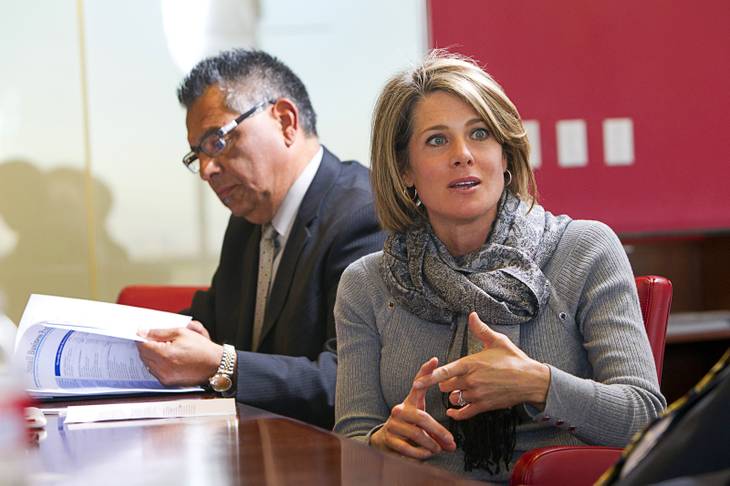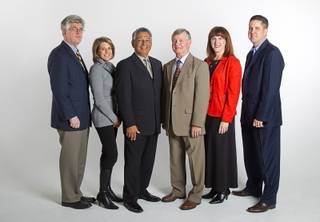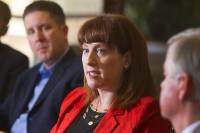State of Economy Panel
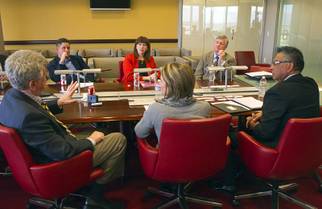
Viewing video requires the latest version of Adobe's Flash Player
On Nov. 14, six Southern Nevada business leaders met to discuss what business lessons were learned in 2012 and what's on the horizon in 2013.
What business lessons were learned in 2012? What is on the horizon for us in 2013?
VEGAS INC assembled a panel of people from different sectors of the local economy to talk about where Las Vegas has been and where it is headed.
The panelists were:
• Tina Quigley, general manager of the Regional Transportation Commission of Southern Nevada.
• Larry Charlton, head of Nevada operations for City National Bank.
• Lori Nelson, vice president of corporate communications for Station Casinos.
• Doug Geinzer, CEO of the Southern Nevada Medical Industry Coalition.
• Stephen Brown, director of the UNLV Center for Business and Economic Research.
• Joe Hernandez, president and chief operating officer of insurance company Branch Hernandez and Associates.
Southern Nevada had another tough year in 2012 with still-high unemployment and foreclosure rates, slow growth in tourism and gaming and a state economic diversification plan in its infancy. How did your industry fare and what lessons did you learn?
CHARLTON: Financial institutions continue to struggle. However, in 2012, we hit the bottom and there are some green shoots happening.
Commercial office space is slowly getting absorbed. We were about 25 to 30 percent overbuilt in that sector. But we saw 300,000 to 400,000 square feet of absorption in October, which is great. We’re seeing some small builders, like Lennar, building in the $200,000 to $300,000 range on new homes.
For small banks, the main income is interest. Small banks generally turn to real estate development loans because they have the best return on investment. That’s why they’re struggling. It’s difficult to turn profits.
Our bank, a regional bank, hasn’t had a losing quarter in 20 years, even through this recession. We have a $4 billion mortgage portfolio and have had 10 foreclosures. That’s it. So there’s a difference between banks.
City National came in right as the economy was bottoming out. We did some things like cost-cutting. A lot of banks have done that. Because we have infrastructure in California, we’ve been able to take advantage of that rather than duplicating it here. Some of the larger banks have had similar reorganization efforts.
HERNANDEZ: After a 25 percent reduction in small business, we’re starting to see more movement now, with banks and the Small Business Administration starting to provide lending for some of the newer startups.
For the most part, I think small businesses, including ourselves, stayed pretty stagnant. If anything, we saw a slight increase in revenues and the potential for hiring staff, but maybe part-time initially with the intent of bringing people on full time.
Overall, the small business community is struggling.
BROWN: The data we’ve collected is very consistent with that. We survey the business community, and we’re finding more financial headwinds here in Southern Nevada than in other parts of the country.
We’re also seeing that small businesses have a positive attitude toward the economy, but it’s barely positive. If they were just a little more pessimistic, the numbers would be negative. Businesses right now are slightly optimistic about the future, but they’re having trouble getting money to support growth.
GEINZER: Health care is in a state of change right now. We’re figuring out how to best consume the Affordable Care Act. Now that it has been upheld by the Supreme Court in June and with the re-election of President Obama, we know that the Affordable Care Act is here to stay. Everybody’s positioning to figure out what that means and how we’re going to handle that.
The economic decline created a tremendous swell of uninsured. For a period of time, 25 percent of the folks walking into the emergency room were uninsured. Somebody had to bear that expense. A lot of our hospitals were operating in the red for the past couple of years, and they’ve trimmed their workforces to get in alignment.
The biggest thing we’re faced with right now is, do we expand Medicaid in Nevada? That’s going to be a major decision the governor will have to make.
NELSON: The theme for 2012 for the gaming industry was stabilization, and we were really pleased to see that consistently, especially in the locals market. We just reported our third-quarter earnings, and three quarters in a row showed modest improvements.
As far as lessons learned, I think the gaming industry is looking at being able to appreciate some consistent recovery over a three- to five-year period. It’s going to take some time, but small indicators have shown that the consistency of that stabilization has been a real positive for the gaming industry.
QUIGLEY: Our funding source is mostly from sales tax revenue. That is applied to our transit operations, and some of it goes to our streets and highways program. A majority of our streets and highways program has been funded through motor vehicle fuel tax. Even though sales tax revenues are starting to stabilize and increase — we’re seeing 6 percent growth right now, which makes us very comfortable — the motor vehicle fuel tax revenues have decreased significantly by about 16 percent. So the streets and highways program is suffering.
We were lucky to get about $169 million in stimulus money which helped us out. But for the future, we’re definitely a little concerned, and we know that infrastructure is going to play a really big part of Southern Nevada’s growth as we work on diversifying our economy. The things that we hear regularly from those who want to bring business here is that you’ve got to have an education system and you’ve got to have a strong transit and transportation program.
Was the optimism people felt at the beginning of 2012 misplaced?
NELSON: I don’t think there’s anything wrong with optimism. I think it’s just that the expectations for defining that hope have changed dramatically over the years.
BROWN: There were a couple of things that happened during the year that changed things. One was that the U.S. economy slowed down at midyear, a lot more than people had expected. That’s showing up in a little weaker visitor volume.
The other thing is Europe went into a recession, and we’re seeing fewer visitors from Europe. We’re getting fewer Germans than we used to.
Then, the Asian economies, which are dependent on exports to the rest of the world, slowed down. So we’re actually seeing fewer visitors from Asia. They matter a lot to the Strip casinos because many Chinese visitors like to play baccarat. If you look at the gaming numbers, you see this steady upward trend but the numbers from baccarat declining. It’s a few visitors from China that are creating that volatility. With the Asian economy slowing down, we’re not getting quite as many of those visitors.
We are seeing a fill-in of California visitors, but they tend to spend less than people who come from farther away.
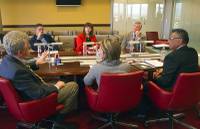
Clockwise from upper left: Doug Geinzer, CEO of the Southern Nevada Medical Industry Coalition, Lori Nelson, vice president of corporate communications at Station Casinos, Larry Charlton, Nevada regional executive for City National Bank, Joe Hernandez, president/COO of Branch-Hernandez & Associates Insurance Services, Tina Quigley, general manager of the Regional Transportation Commission, and Stephen Brown, UNLV professor of economics, participate in an economic roundtable discussion at the Las Vegas Sun Wednesday, November 14, 2012.
CHARLTON: On the banking side, we did look at 2012 with some optimism but the first fiscal cliff stalemate in Washington killed that, and we saw a definite impact in the end of the first quarter and second quarter.
I’m concerned as to what’s going to happen as the fiscal cliff looms again. Hopefully, our Washington brethren get their acts together.
BROWN: Certainly the fiscal cliff is affecting investment spending locally and nationally.
Are your industries reaching out to lawmakers to address the fiscal cliff?
NELSON: In gaming, we have a great relationship and rapport with our representatives. We’ve expressed our views and that dialogue has been going on, and we’re really hopeful that they’re going to go in and take some responsibility and help Nevada.
Are you confident that the Nevada delegation will step up and resolve it?
NELSON: We have a lot of faith in the Nevada delegation. Having the Senate majority leader, Harry Reid, is very good for Nevada. He certainly knows our state inside and out and is very protective of Nevada, and we believe very much that he and everybody else will go out there on our behalf.
QUIGLEY: From a transportation perspective, I would agree. Sen. Reid was absolutely instrumental in getting the new transportation bill passed. He worked really hard to get that thing through.
How does the re-election of President Obama affect your industry? Would you be better off had Mitt Romney been elected?
GEINZER: A lot of health care leaders took a wait-and-see approach. We weren’t certain what was going to come about in this election and whether the Affordable Health Care Act would be repealed. Now that we know it’s going to be upheld, we’ve got several years ahead of us of really defining what that means.
There are 2,600 pages in that act. I believe the administration had good intentions to solve our health-care problems, but they decided to eat the whole pie at once. That’s going to create some challenges for us in the future. Health care over the next year is going to look a lot different because we’re going to be moving to an accountable care organization where we start looking at managing the health of a person through their whole life span.
HERNANDEZ: There are several triggers that both small and large businesses are concerned about. The cost of health insurance is going to go up. With pre-existing conditions no longer being a problem, if you go to get health insurance and you have a pre-existing condition, the mandate allows you to have coverage but it doesn’t require the insurance companies to contain the cost. What’s going to happen is that people with pre-existing conditions are going to find themselves paying more money.
The second thing for small-business people is that by 2016, the credit that we would be getting for 50 percent of the insurance being paid by the employer is going to go away. At that point, there’s no incentive for the employer to offer health benefits because I’m not going to get any credit for it, so now it falls back on the individual.
Another concern on the Medicare side a reduction in access to doctors. We saw recently that Health Plan of Nevada and a couple of others discontinued their Medicare programs. So now you’ll have fewer doctors to choose from that will provide Medicare services. Is that going to create long waits for medical services, especially for the elderly? There are a lot of things that are unknown.
The cost — that’s another fatal flaw. We really don’t know how much this eventually is going to cost taxpayers.
Larger businesses with 50-plus employees have to worry about the penalty. Do I reduce the number of hours people are going to work so I’m not required to cover them? Do I pay the penalty as opposed to buying insurance? There are a lot of issues and uncertainty going on.
Are we going to see layoffs?
HERNANDEZ: Absolutely.
CHARLTON: Absolutely. I echo Mr. Hernandez’s hope that our representatives in Congress and the Senate, on both sides of the aisle, get together to lessen some of these impacts.
I’m staring at something on the financial side with the Dodd-Frank Act (on Wall Street reform and consumer protection). It leaves wide open how they’re going to regulate certain things, just like the question of how we are going to pay for the Affordable Care Act. The devil is in the details.
Interestingly enough — and you can say this about health care — when I joined the bank I’m with, I was on the compliance committee and we had 12 people in the United States working in compliance. Four years later, we have 130 people who do nothing but compliance.
QUIGLEY: That is a stimulus bill. That’s job creation.
HERNANDEZ: That’s bureaucracy.
CHARLTON: You can imagine what the small banks are going through. Small banks are the lifeblood of community development. That type of expense will kill them.
BROWN: My prediction is that the election probably really didn’t mean a lot because Romney would have had a very difficult time unwinding things. Basically, the trains were gone from the station.
Government spending is mostly set in stone. Taxation is mostly set in stone. He probably would have been facing a Democrat-controlled Senate, so I think the amount of gridlock we saw in Washington over the last four years would characterize the next four years had Romney been elected. Now, if he had won in a landslide that had coattails and put Republicans in charge of the Senate, things could be a lot different. I didn’t foresee that in the election. There were a lot of things that were done in the last four years that may slow economic growth, but I don’t think Romney could have done much to stop them.
What are your expectations for your industry in 2013?
CHARLTON: Banks make more money when interest rates start rising. That’s not going to happen. It’s going to cost the country too much. With the debt that’s out there, you start raising rates, you raise rates on our debt and the countries that are buying it get more income. You don’t want to do that.
At the end of the day, we buy money low and sell it high, and the spreads right now are pretty thin. We think we’re going to see a continuation of about where we are, maybe a slight uptick. We think it’s going to be a tough year to see profit growth.
QUIGLEY: I think we’re going to continue to see an increase in ridership. More people are going to start to realize that being a two-car family isn’t essential and they can be a one-car family. They’ll either carpool or take transit to work. We will continue to work on our workforce mobility plans, reaching out to people and informing them of what transit options are available.
I am concerned from the street-and-highways perspective that funding is going to continue to dwindle. Motor vehicle sales tax has decreased to the point that we make more money on ticket fare collections than we do in fuel tax. Our fuel tax is set at 9 cents a gallon. Even though the cost of gas continues to increase, the investment in infrastructure does not necessarily.
At the same time, we know that if we’re going to grow Southern Nevada, infrastructure investment is really important. The worst thing that would happen is that you wouldn’t see regular maintenance and you wouldn’t see growth. If we are truly going to create a community where people choose to live, congestion cannot be a limitation. If businesses are going to move here, what they look for is a work force that can get to their place of business within 20 minutes.
GEINZER: I think health care is going to see a lot of mergers and acquisitions. A lot of the one-, two- and three-doctor practices don’t have the infrastructure in place to adapt to the Affordable Care Act, so they’re going to be acquired by larger organizations.
I also think you’re going to see primary-care physicians retire. They’re tired of the game, and they’re going to exit. They aren’t earning the kind of money they’re accustomed to because the Medicare and Medicaid reimbursement rates are so low. We’re going to be challenged. We already have a primary-care physician shortage and an influx of uninsured that will soon become insured will start seeking care.
A lot of talk will be about what we call “scope of practice.” Can a nurse practitioner or physician assistant handle the initial assessment of a patient so they don’t need to see a physician?
One of the opportunities we’re working on right now with the Las Vegas Convention and Visitors Authority is bringing together the health-care and hospitality industries for medical tourism. How do we position Las Vegas to be a health-care destination? There are centers of excellence here where people are traveling already for certain types of care, for plastics or bariatric surgery or fertility. Cancer treatment and brain health have taken a nice lead. How do we take those centers and scale them to help put heads in beds? At the same time, we’d be building our health-care infrastructure to help the local community so that when we get sick, we don’t have travel out of the market.
HERNANDEZ: The construction industry really drove a lot of the economy in Las Vegas. What I think is happening right now is not only has the loss of the construction industry created a great deal of the recession here, but it has resulted in a trickle-down effect. All the small businesses providing services — a restaurant, cleaners or whatever — reduced their work force and lost a tremendous amount of revenue.
If there’s a way to encourage bringing new industry into Nevada, that will affect gaming, health care, banking, transportation and, of course, small business by creating opportunities to get our economy back again. Even on a national level, construction drives the economy, and small business is the backbone that helps accelerate that.
CHARLTON: I’ve talked to two manufacturers in California in the last week that want to move here. The reason is taxes. People are not going to stay in that state. That’s good and bad for us, because a good California makes us better because we get a lot of people visiting from there.
QUIGLEY: That’s so exciting to hear. I think it’s our goal, vision and responsibility as Southern Nevadans to be prepared for that, to start investing in ourselves. It all came so easy to us. I came here in 1990 and at that time, people came here just because we were who we were. So it was very humbling and humiliating as we woke up and realized that now we have to work for it. I get excited when I hear stuff like that, but there’s a call to action for us, too.
CHARLTON: Exactly. The issue is education because they need to have workers. The one I was talking to was an aerospace contractor. They don’t need hammer-and-nail people. They need people with education.
Where should the money for improvements come from?
HERNANDEZ: That’s a loaded question.
CHARLTON: Nobody wants higher taxes, but this is an investment in us. I don’t want to pay for it, but I see the importance.
BROWN: Especially if you look at economic research that shows that communities that invest in infrastructure and education tend to do better.
QUIGLEY: It’s an obvious need, but at the same time, it’s painful and hard to take action on it.
NELSON: It’s a little naïve, but the answer is everyone’s responsible. You’ve really leaned on a couple of industries like mining and gaming in the past, where it was always easy and everyone else had that cover, but you have to diversify and broaden with everyone stepping up and sharing in that responsibility.
CHARLTON: It’s not just gaming, it’s property taxes. Property taxes pay for a lot of it, and nobody wanted to do it. We saw what happened in the election. The public rejected tax increases 2 to 1. That shouldn’t have happened. We’ve got to have that infrastructure. We need more.
What are you doing to better position your companies or industries in 2013?
QUIGLEY: Partnership. In transit, we’ll partner with a casino to develop a park-and-ride facility for employees. On streets and highways, we’ll take a look at exploring public-private partnerships with large construction companies that would be interested in doing something like the Boulder City bypass. We’re going to be exploring tolling as an option for the Boulder City bypass. We’ll be breaking the mold when it comes to traditional transit and transportation. We won’t be operating as an island as much.
BROWN: Historically, UNLV has produced more engineering and science graduates than can find jobs in Southern Nevada. So we have a new office of economic development that’s trying to promote partnerships with the private sector with the hope of transferring university technology to the private sector and creating opportunities for graduates of UNLV to stay in this community and contribute to its growth.
GEINZER: We were fortunate to work with one of the workforce investment boards to develop the Health Care 2020 program. In nine months, we were able to design, develop and implement the most successful workforce program in Nevada. Frankly, we think it may be the best in the country.
We reversed the whole model. We went out and found where the demands were and created training programs to meet those demands.
What can lawmakers do to get Southern Nevada’s economy on track?
NELSON: For gaming, it’s federal legislation for online gaming. We think that’s a very important step that will be great for job growth.
And we’ve got to fix that Wire Act. We need a thoughtful strategy in place to do this right. Station Casinos has set up Fertitta Interactive for online wagering and just got approval from Nevada regulators, but we prefer federal, especially considering what’s unregulated and what’s happening outside the states.
CHARLTON: Fixing Dodd-Frank for the financial institutions. Congress really doesn’t understand the industry and the ins and outs of Wall Street banks versus commercial banks versus any other kinds of banks. You just can’t paint the whole thing with a broad brush and expect to fix it.
We also want to make certain we don’t have any local regulations on the financial industry that hurt us. But that generally doesn’t happen. It’s more on the federal level.
HERNANDEZ: There is federal regulation being proposed where you’d have a federal insurance regulator as opposed to a state regulator. I think states should continue to have the control.
On the local level, the only thing I would be concerned with is taxation. We don’t want a margin tax. The modified business tax basically doubled the tax. If your payroll exceeds a certain limit, you get taxed higher. I think those taxes that should have been sunsetted and weren’t hopefully will be sunsetted permanently in the next cycle.
The other thing that concerns us is access to capital. How does somebody who has been in business for several years but has seen their revenue and credit damaged by the economy go back and capture opportunities when banks won’t loan them money? If you look at how they performed historically, they have profitable trends but not to the level they were doing three to five years ago.
CHARLTON: What the banks run into is regulators who come in and start downgrading loans if we only look back at six months of profit instead of two years. If you go backward two years, you’re not going to find anybody that had positive profit trends.
Congress talks one way, the regulators talk the other. Because of the problems with banks, regulators got beat up because many of them were bad. Now, they’re tougher than ever.
We have $6 billion that can be turned into assets. We want to make those loans, but we can’t. It’s the underwriting regulations of lending. I understand that we don’t loan our own money; we lend depositors’ money, and it’s proper to regulate banks because of that. It’s the appraisals. It’s the loan-to values.
What has to happen for your industry to fully recover from the recession, and how long will that take?
BROWN: I don’t think the U.S. economy will recover fully until 2017 or 2018, and I expect Nevada to be a little bit behind that. And if we think of real estate as having to be back the way it was in 2007, the answer is never.
QUIGLEY: The more urbanization we have in Las Vegas and downtown, the more people will take transit. I fully expect it to exceed previous levels. In fact, we’re getting close, if we’re not already there.
In terms of transit, we’re going to be a growth industry. As our population ages, there will be more demand for paratransit, and that will be costly for us.
In streets and highways, we’re never going to get back that motor vehicle fuel tax so it’s up to us to figure out how we’re going to rectify that.
Even though they approved the transportation bill, we still need the federal government to allocate money. About 17 percent of our revenue comes from federal grants. We expect that number to be dwindling as well.
HERNANDEZ: Over the next three to five years, you may see some slight increase in profits for small business people, but there are still uncertainties of the Patient Protection Care Act and the economy. There’s minimal optimism as to how successful one can be.
I think the concern overall is how much of the money that I make am I going to get to keep and how much am I going to have to pay in taxes.
CHARLTON: Locally, recovery is going to take five years or more. With real estate development, we shouldn’t go back to that peak level because we’d just be creating another bubble.
Locally, we’re doing business a little bit differently. We’re strategically looking at niches in professional services that are doing well — doctors, CPAs, lawyers — and catering to them.
NELSON: It’s going to take continued patience. We believe three to five years in the gaming sector. Because we cater to locals, our key indicators are things like housing and job stability. We’re about the discretionary dollar. People still want to be entertained, but they want to feel comfortable.
GEINZER: We need a better-insured population, and that doesn’t come about until employment gets corrected. The higher the unemployment level, the more uninsured we have. That does more cost shifting so that those of us who carry commercial insurance pay for those who don’t. Until we employ more of our workforce, health care is going to be challenged.
We’re hoping to correct some of that with medical tourism by shifting the payer mix, so we can attract people with insurance and cash-paying patients here to offset some of the losses we’re currently experiencing with Medicare and Medicaid and uninsured.
